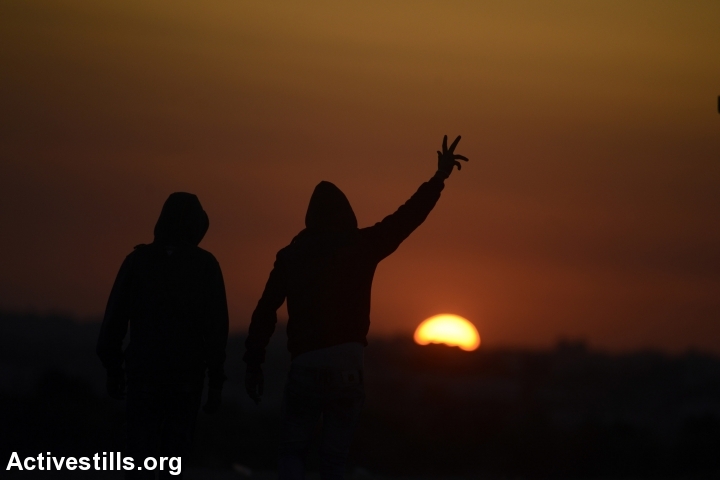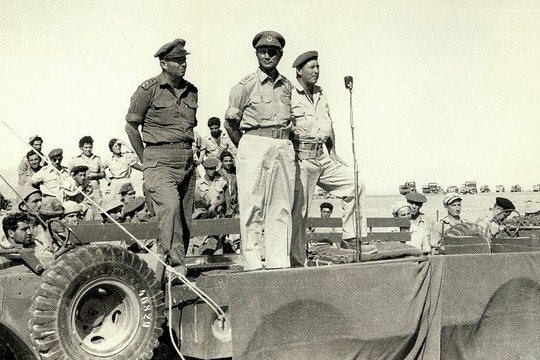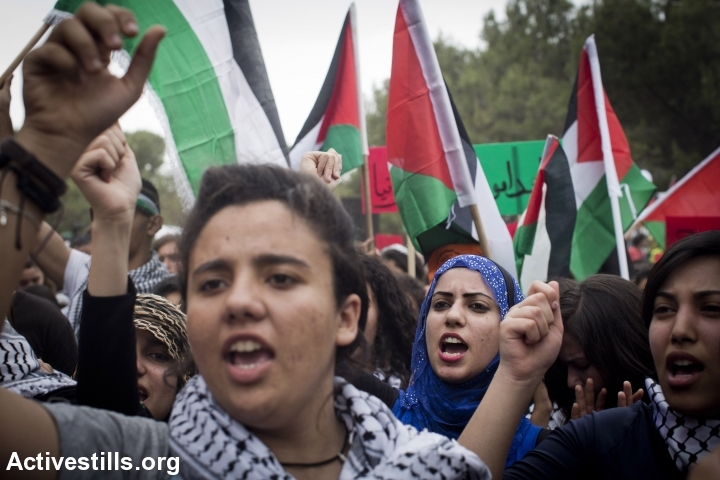70 years later, Palestinian refugees are no longer waiting for peace talks to determine their fate. In Gaza, they are actively reclaiming their place at the table.

On a warm spring day in late April 1956, Moshe Dayan, then the IDF chief of staff and Israel’s eminent war hero, delivered an address that would become a central part of Israel’s national ethos. Dayan had arrived at Kibbutz Nahal Oz to eulogize Roi Rotberg, a kibbutz security guard who was ambushed by an Egyptian police officer and a Palestinian farmer, and then abducted into the Gaza Strip where he was brutally murdered. The chief of staff had met Rotberg the previous day during a routine visit to Nahal Oz, as the community was preparing for a number of upcoming weddings. The eulogy took him just half an hour to write.
Rotberg’s murder was especially gruesome, shocking a country that had already seen a tremendous amount of bloodshed and calamity in a short period of time, imbuing the eulogy with a warrior pathos of the kind one would hear from today’s leaders. “Our children shall not have lives to live if we do not dig shelters; and without the barbed wire fence and the machine gun, we shall not pave a path nor drill for water,” Dayan told the crowd. “The millions of Jews, annihilated without a land, peer out at us from the ashes of Israeli history and command us to settle and rebuild a land for our people.”

Dayan’s speech was likened at the time to Israel’s version of the Gettysburg Address, a sober statement of purpose delivered to those who shouldered the burden of carrying on the nation’s mission. But the eulogy also carried a curious secondary message: it was the first public address by a high-ranking member of the Israeli military brass to acknowledge — without reservations — the suffering that Palestinians had endured during the establishment of the State of Israel, as well as the source of their rage:
Let us not hurl blame at the murderers. Why should we complain of their hatred for us? Eight years they have sat in the refugee camps of Gaza, and seen, with their own eyes, how we have made a homeland of the soil and the villages where they and their forebears once dwelt.
Not from the Arabs of Gaza must we demand the blood of Roi, but from ourselves. How our eyes are closed to the reality of our fate, unwilling to see the destiny of our generation in its full cruelty. Have we forgotten that this small band of youths, settled in Nahal Oz, carries on its shoulders the heavy gates of Gaza, beyond which hundreds of thousands of eyes and arms huddle together and pray for the onset of our weakness so that they may tear us to pieces — has this been forgotten? For we know that if the hope of our destruction is to perish, we must be, morning and evening, armed and ready.
Today, more than six decades later, as Palestinians in Gaza — the majority of them descendants of refugees of the 1948 war who fled or were expelled from their homes — march toward the border with Israel, Dayan’s words resonate as strongly as ever. Before Netanyahu, before the racist laws, before two intifadas, and before the military dictatorship in the West Bank and Gaza, came Israel’s policy of preventing Palestinians from returning to their villages, towns, and cities.
Long before bands of Palestinian fedayeen crossed the border from Gaza and often committed violent attacks against Israeli security forces and civilians, Prime Minister David Ben Gurion ordered the army to shoot and kill Palestinian “infiltrators” — the majority of them refugees who had crossed newly-created borders in order to retrieve livestock, tools, or work their land.
Dayan’s statement of purpose is clear: we displaced these people, their anger is beyond warranted — but we are not letting them come home. It was the denial of return that sparked the Palestinian national movement, which was led by those living in exile until the 1980s, when the First Intifada swept across the occupied territories. Before that uprising, the Palestinian revolution was led by those whose homeland was denied to them, who often operated out of Arab states that suffered from the lingering refugee issue while simultaneously exploiting it for political gain.
The protests at the Gaza border have various goals: to end the 11-year blockade on the Strip, to call attention to the humanitarian conditions plaguing its residents, and to bring freedom to what has been called the world’s largest open-air prison. But there is a reason the protests in Gaza are being held under the banner of the “Great Return March” and are culminating on Nakba Day, when Palestinians mark their expulsion from their homeland: it puts the issue of Palestinian refugees back at the center of the international conversation.

The consequences of the march for Israelis and their supporters, at least presently, are negligible. The carnage at the border with Gaza — with over 45 killed and thousands wounded by Israeli snipers — has little effect on a public that does not take kindly to any form of Palestinian protest, least of all the kind that puts Palestinian refugees, seen as the ultimate threat to the state’s existence, at the forefront. In the spirit of Dayan, Israelis — even many of those on the mainstream left — have become convinced that the only way to ensure Jewish life in this land is by the sword (even if there is some movement in the direction of accepting return under certain conditions).
The international community, and especially activists abroad, will be forced to contend with a different question. Organizations that support justice in Israel-Palestine will have to decide not whether they support the right of Gazans to march (which they overwhelmingly do), but whether they support the central message that lies at its core: that Palestinians should be able to return to their villages, towns, and cities.
Various attempts to broker peace between Israelis and Palestinians attempted to find workable solutions to the refugee problem. But with the veritable death of the peace process, Palestinian refugees are no longer waiting around for leaders to decide their fate; they are actively reclaiming their rightful place at the table, and activists of all stripes will inevitably be called upon to decide where they stand.

